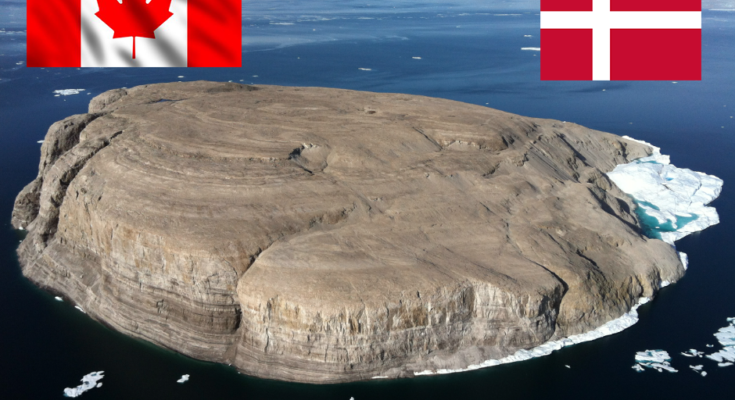In the icy waters between Canada and Denmark, an unusual territorial dispute has played out for decades—not with violence or political tension, but with flags, friendly gestures, and bottles of alcohol. This lighthearted conflict, centered on Hans Island, exemplifies what happens when two amicable nations disagree over a small piece of land.
What is Hans Island?
Hans Island is a small, barren, and uninhabited rock located in the Nares Strait, which separates Canada’s Ellesmere Island from Greenland, an autonomous territory of Denmark. The island, roughly 1.3 square kilometers in size, sits equidistant between the two landmasses. Despite its lack of resources, its strategic position led to a longstanding dispute between Canada and Denmark, both of which claimed ownership.

The Origins of the Dispute
The conflict over Hans Island dates back to 1973 when Canada and Denmark established a maritime boundary in the Nares Strait. While they successfully divided the waters, the status of Hans Island was left unresolved. Over the years, both nations continued to claim the island, leading to a unique kind of territorial battle.
The Whisky War: When Nice Countries Disagree
Unlike most border disputes, which involve military tensions or diplomatic hostility, the Canada-Denmark disagreement over Hans Island became known as the “Whisky War.” Instead of engaging in open conflict, both countries took turns asserting their claim in a humorous and symbolic way.
Canadian and Danish officials, along with military personnel, would periodically visit the island to remove the other nation’s flag and plant their own. To make things even friendlier, they would leave behind a bottle of their national drink—Danish schnapps or Canadian whisky—as a goodwill gesture. This playful back-and-forth continued for decades, gaining international attention for being one of the most civilized border disputes in history.
Why Did the Dispute Last So Long?
Despite its lighthearted nature, the Hans Island dispute carried legal and political significance. Ownership of the island was tied to broader claims over Arctic waters, which have become increasingly valuable due to climate change and the opening of new shipping routes. Both Canada and Denmark had economic and geopolitical reasons for maintaining their claims, but neither was willing to escalate the issue into a serious conflict.
Additionally, the island held symbolic value for both countries. For Canada, maintaining sovereignty over its Arctic regions was a priority. For Denmark, asserting control over Greenland’s surrounding territories was important for its influence in the region. However, both countries recognized that the dispute was minor in the grand scheme of international relations.
A Peaceful Resolution: The 2022 Agreement
After nearly 50 years of friendly rivalry, Canada and Denmark finally reached a resolution. On June 14, 2022, both nations signed an agreement to officially divide Hans Island in half, creating the first land border between Canada and Denmark. The agreement was hailed as a model for peaceful conflict resolution, demonstrating that even territorial disputes could be settled through diplomacy and mutual respect.
The resolution of the Hans Island dispute also had broader implications. It reinforced international norms of negotiation and compromise, particularly in the Arctic, where geopolitical tensions have been rising. Additionally, it showcased how two friendly nations could settle differences without resorting to hostility.
The Legacy of the Whisky War
The Hans Island dispute remains one of the most amusing and well-mannered conflicts in modern history. It serves as a reminder that not all border disputes have to be contentious. Instead of resorting to aggression, Canada and Denmark turned their disagreement into a quirky tradition that strengthened their diplomatic ties.
Even though the island is now officially divided, the legacy of the Whisky War lives on. It is a testament to the power of peaceful negotiation, the value of good humor in international relations, and the unique way in which nice countries fight.



